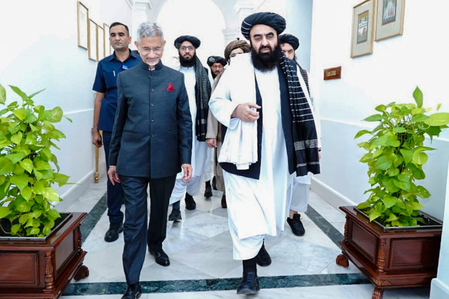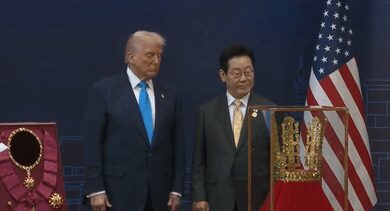Taliban extends outreach to other nations following Foreign Minister’s India visit

New Delhi, Oct 17 (IANS) Pakistan’s diplomatic turnaround on a group that it once bred on its soil and helped prop up its regime twice in Kabul, rising volatility at its border with Afghanistan, among other issues, have led the Taliban leadership to look elsewhere to seek support for a beleaguered nation.
Soon after Afghanistan’s Foreign Minister Amir Khan Muttaqi’s interactions with diplomatic and business circles in India, his colleagues have stepped up outreach towards China and Russia as well.
Deputy Prime Minister for Economic Affairs, Mullah Abdul Ghani Beradar Akhund, this week hosted representatives of several Russian companies intending to invest in the energy and mining sectors.
At the same time, Deputy Minister of Foreign Affairs for Finance and Administration Mohammad Naeem met the Chinese Ambassador to Kabul, Zhao Xing, to discuss strengthening bilateral relations.
Incidentally, Russia is the only nation to have granted recognition to Afghanistan’s rulers, while China officially hosts the Taliban’s diplomatic emissary in Beijing and has an embassy in Kabul, but has not yet officially recognised the government.
The Russian delegation has expressed “strong interest” in investing in key sectors, including oil exploration and extraction, copper and chromite mining, water management, electricity production, and manufacturing of technical machinery, according to a statement from the office of the Deputy PM for economic affairs on Thursday.
The companies, reported the Kabul Times, quoting the official communique, have also announced plans to open a permanent office in Kabul to facilitate rapid coordination with relevant Afghan government institutions.
Meanwhile, Deputy Minister Naeem, after meeting Ambassador Zhao, issued a statement appreciating Beijing’s “continued support”.
China’s diplomatic emissary has reaffirmed that issues should be resolved through dialogue and mutual understanding, not conflict, a separate report added.
Afghanistan remains a geopolitical fulcrum in Central and South Asia, drawing intense interest from regional powers.
Since the Taliban’s return to power in 2021, the country has undergone dramatic shifts in governance, diplomacy, and regional engagement.
This year’s rapid developments underscore how Moscow, New Delhi, and Beijing are recalibrating their approaches to Afghanistan, seeking influence while navigating the complexities of Taliban rule, regional instability, and global realignments.
Russia’s engagement with Afghanistan is driven by a blend of economic ambition and strategic caution. Yet, Moscow remains wary of extremist spillover in Central Asia, as the global community remains cautious over the Taliban’s real stance on transnational terror groups like ISIS-K and Al Qaeda.
Kabul has, however, reiterated its distance from the terror group, claiming to abide by its commitment of not allowing such outfits to operate on its soil.
Russia further aims to counter Western influence and assert its relevance in Eurasian affairs. The Kremlin sees Afghanistan as a bridge to bolster ties with Pakistan and Iran, both critical players in its anti-Western coalition.
China’s interest in Afghanistan is rooted in its Belt and Road Initiative (BRI), regional security, and mineral acquisition.
Beijing is eyeing Afghanistan’s vast lithium reserves, essential for its electric vehicle and battery industries. Infrastructure projects, including railways and roads. Such efforts are being considered to integrate Afghanistan into the BRI.
It also seeks Kabul’s cooperation as a security buffer, with Uyghur separatists having alleged bases in Afghanistan. Beijing is pressing the Taliban to crack down on the Uyghurs’ East Turkestan Islamic Movement (ETIM), which Beijing labels a terrorist organisation.
India’s relationship with Afghanistan has historically been warm, with a period of freeze during the first tenure of the Taliban regime. New Delhi had kept channels open in the group’s second term, without officially recognising the government. Looking at India’s investment, which exceeds $3 billion, in Afghan infrastructure, including the Salma Dam and the Afghan Parliament building, Kabul intends to urge New Delhi to resume work soon.
India has promptly dispatched medicine and relief materials when the country suffered from natural disasters. With the resumption of talks and growing mutual trust, India may explore ways for limited trade.
The Taliban, meanwhile, is leveraging these competing interests to secure economic aid and political legitimacy.
By engaging with all three powers, Kabul aims to diversify its partnerships and reduce dependency on any single actor.
–IANS
jb/vd




